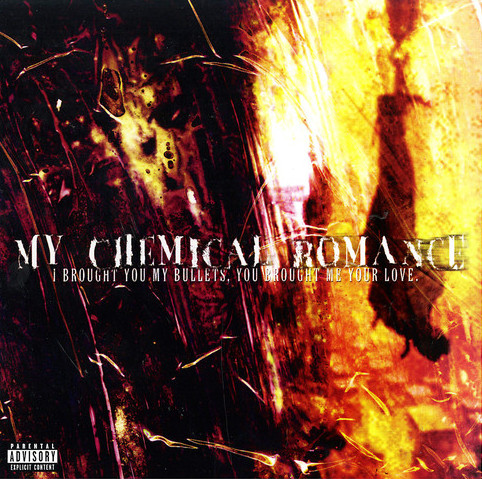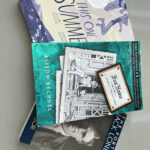Searching For A Big-Sky Song
The twin towers fall. A man watches, and through the fire he sees people falling too. He’s a prophet, Joan of Arc stuck in a neurotic twenty-four-year-old from suburban New Jersey, and suddenly he can’t make out the future through the rising smoke.
He goes home, and calls up his brother and his friend. He tells them: “You’re not in this alone.”
***
It’s cold and damp, my glasses are fogging up. I pull them off, and stare at the astigmatic flares of light from the cars and street lamps. If I lived in New England the trees rushing past the window would be orange and red, but instead they are brown against a wide whale-blue sky.
If my glasses would stop being foggy and smudgy I would be able to see the future too, I swear, but before the future comes there will be a puddle I step in and math homework to do, and dentist appointments to schedule, and the quotidian sheers up in front of me, blocking my field of vision.
***
My Chemical Romance recorded their first album, I Brought You My Bullets, You Brought Me Your Love, in May of 2002. Gerard Way sang, his little brother Mikey played bass with startling mediocrity, and Ray Toro played lead guitar. Their original drummer, Matt Pelissier, who would leave the band after the first album, could barely keep time. Halfway through the recording process they add a nineteen-year-old Frank Iero, fresh off the breakup of his band Pencey Prep.
Ray Toro’s guitar playing is probably the best musical innovation to come out of New Jersey since Bruce Springsteen. He’s part classically trained, part self-taught metalhead. My Chemical Romance sprung out of the post-hardcore scene in the tri-state area, playing up to bands like Thursday, Saves the Day and Midtown.
“Early Sunsets Over Monroeville” is the first song the entire band is on together. Frank’s rhythm guitar, written in the back of a van the day of recording, fills in the blank spots of Ray’s haunting melody. The song is an ode to George A. Romero’s “The Dawn of the Dead.” It’s one of the few songs the band will ever write that isn’t autobiographical or part of an elaborate concept album. Instead, it’s born from a love for zombie movies.
***
It took me a while to start listening to Bullets. Their other albums are simply better, lyrically and musically. Bullets is pure emotion, closer to the band’s hardcore origins than any of their other work. While all their other albums follow plots laid out by Gerard, Bullets is more personal. It deals with Gerard’s alcoholism, his burgeoning pill addiction, his fears of entering the workforce and growing up and the immediate conservative shift in the wake of 9/11. When he sings, that’s Gerard Way screaming. Not one of his characters.
The last two minutes of “Early Sunsets” is an extended chorus. Gerard wails, full-bodied: Geoff Rickly, lead singer of Thursday and producer of the album says of the recording
“Afterwards, everybody just left and went outside to smoke cigarettes because they couldn’t deal with looking at him after he had sung that. He had just ripped himself open in front of everybody. He’d taken it so far that it was uncomfortable for anyone who was friends with him.”
***
In some cities the sky hovers about three inches above the ground. This is most prevalent in the Midwest, but seeps into San Francisco as well. In New York the sky never quite touches the ground but the alleys between the buildings crowd with fog, a ceiling over the city. Portland isn’t like that. The sky is always at least as tall as the skyscrapers, even as rain tries to tether it down.
It’s a wonder that four guys from New Jersey, a place where the sky simply sinks into the boggy earth on either side of the highway, managed to capture the wideness of the sky.
Mythopoetics
My favorite gimmick in horror movies is when a character will watch a horror movie within the narrative itself, foreshadowing their gruesome death later in the film. The story creates itself. Gerard wanted to stop after the first album. But their trajectory pulled them forwards, into the starlit visions Gerard saw when he was younger.
Towards the end of “Early Sunsets,” it all falls apart. Gerard falls off rhythm, and Ray can’t keep all of them in time. Ray plays the same riff again and again, losing the tempo himself until the last minute of the song can barely sustain itself, until Gerard’s voice fades.
The story contained in Bullets is of a man hitting rock bottom and grabbing a shovel. Gerard wouldn’t play a show sober from the band’s conception until late 2004. The chorus of “Early Sunsets” captures despair, pure and simple. The album is raw, Gerard flaying himself open and asking the listener to do the same.
***
I’ve been drawing zombies lately. It’s my version of staring blindly in static, just waiting for the knife in my back. The visions from G-d have turned out to be a bit of a hassle. They bump into me all the time, lightning crawling up into my eye sockets. Deja-vu for the future.
***
The first verse of the “Early Sunsets” details an everyday life, giving thanks for the “late dawns and early sunsets…counting your face among the living… elevators and half-priced sales/trapped in by all these mountains.” Television-perfect love. Gerard is obsessed with facades, with monsters that hide in plain sight.
It’s a love story. “Counting your face among the living… I fought them all off, just to hold you close and tight.” A lot of the band’s songs feature reanimation. “Early Sunsets” is not about that. The end of the song is final. I’m sorry.
***
I almost lost someone, once. I’ve watched someone get ripped apart by zombies, by ghosts, by ghouls and vampires and banshees. I saw the future then, in stark black-and-white. Living your life through the future– it makes you scared to step on sidewalk cracks.
Coasting On Potential Towards A Wall
Ok so it’s summer, because of course it is. It’s blistering hot and the light is hazy and golden, and time has stopped. Fate has plans, but for now we are in the sunshine.
Kill the house lights, reset the scene. This hasn’t happened. There is nothing like this summer. I spend my summers alone, and time keeps crushing me under an anvil, Wile E. Coyote style.
The future hasn’t arrived yet but it’s hurtling towards me at exponential speed. When I was younger I thought the rainbow oil-slick in parking lot puddles was beautiful. They were endless spirals, stretching outwards and curling inwards. These days I see the pavement.
When I try to think about what’s coming next my chest seizes, a physical reaction to fear usually only produced by spiders and people washing cast iron pans with soap. It’s a stress response, the vestiges of a primal brain leaving a mark on the fossil record.
***
“Early Sunsets” has only been played live three times. Only one of those times was recorded, Halloween ‘03. The sound is staticky, an MP3 of a camcorder microphone. People talk and laugh over each other, call for drinks, shout. But for the chorus, the crowd and the band, they all join in and sing. “But does anyone notice? But does anyone care?”
***
The movie ends with a helicopter flying towards the sunrise. The song ends with another sunrise, enough light to see a body– no, a corpse, stretched out in a bed.
***
On my bus ride to school we go down an overpass, meeting the highway at the bottom. The view turns from winter-sparse deciduous trees to open, facing the river. I can see the Cascades, stark white. The entire city laid out before me.
Through the clouds I can stare directly into the sun.





Leave a Reply